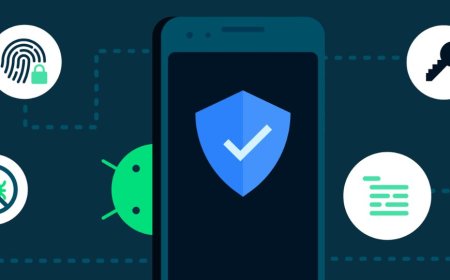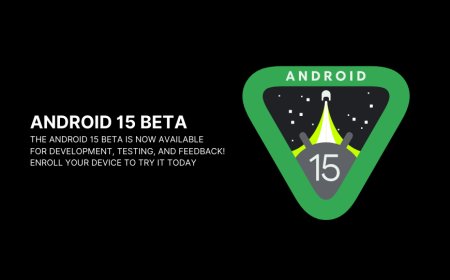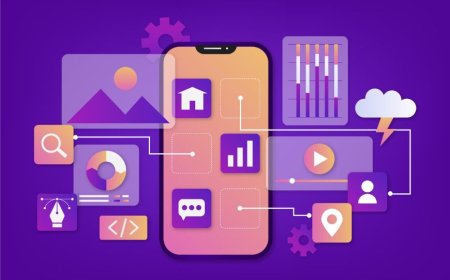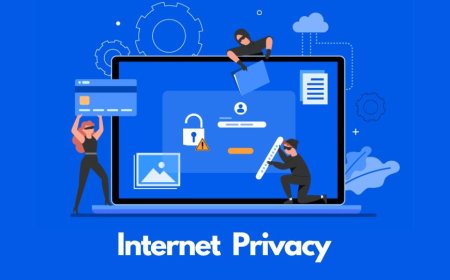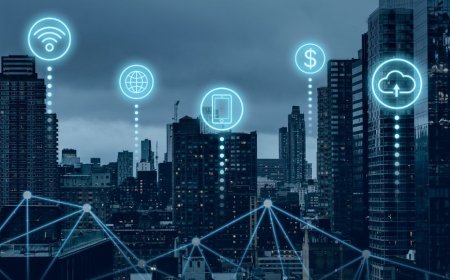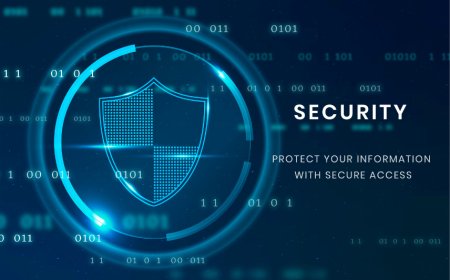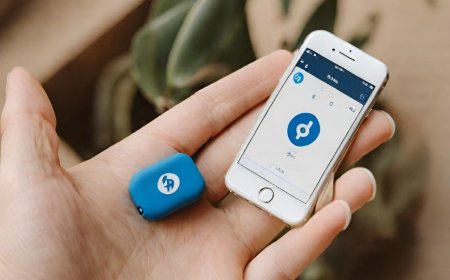Internet Security 101: Protecting Your Digital Presence
Tectoks: Empowering you with Internet security knowledge. Protect your digital presence and navigate the online world securely with our expert tips.
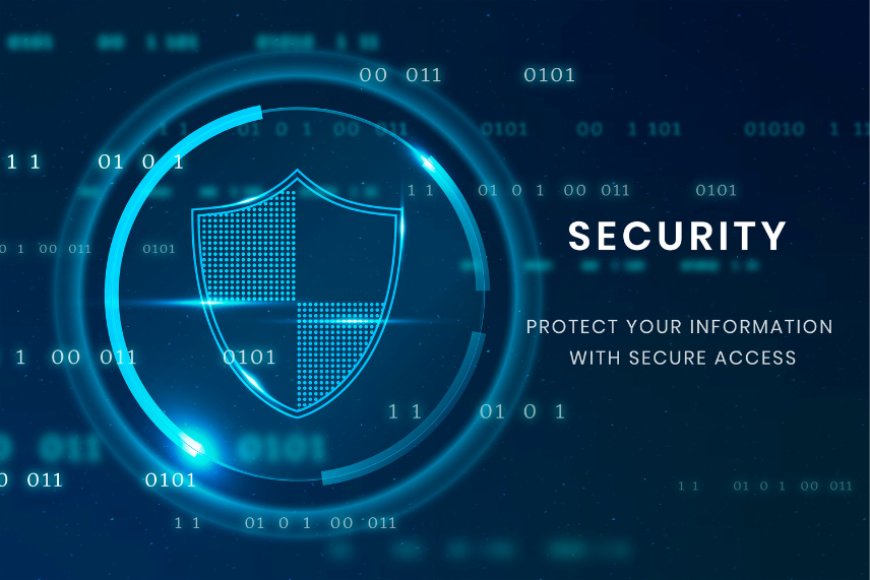
Table of Contents:
-
Introduction
-
Cybersecurity Basics
-
Digital Privacy
-
Data Protection
-
Internet Safety Tips
-
Cyber Threats
-
Summary
1. Introduction
Imagine this: You open your email to find a notification stating your bank account has been drained, followed by a flurry of calls from strangers claiming to be debt collectors. Your heart sinks as you realize your personal information has been compromised online. This is the harsh reality of poor internet security, and unfortunately, it's not a scene from a thriller movie but a scenario millions face every year.
What is Internet security?
In simple terms, internet security is like a digital padlock for your online life. It encompasses a set of practices and tools that protect your online information, devices, and activities from unauthorized access, theft, or harm. This includes safeguarding your data (personal details, financial information, etc.), preventing malware infections, and thwarting malicious attempts to exploit your online vulnerability.
Why is it important?
The internet is a double-edged sword. While it opens doors to endless opportunities, it also exposes us to a myriad of threats lurking in the shadows. From sophisticated phishing scams to data breaches orchestrated by sophisticated criminal gangs, the risks of inadequate online security are far-reaching and can have devastating consequences.
Consequences of Poor Practices:
-
Financial Loss: Identity theft, online banking fraud, and ransomware attacks can drain your bank accounts and leave you in crippling debt.
-
Damage to Reputation: Online harassment, misinformation campaigns, and even hacked social media accounts can tarnish your personal or professional image.
-
Privacy Violation: Loss of control over your personal information can put you at risk of stalking, unwanted marketing, and even physical harm.
-
Psychological Distress: Anxiety, fear, and depression are common side effects of cybercrime, impacting mental well-being and overall quality of life.
The Need for Savvy Navigators:
Just like we wouldn't venture into a dark alleyway without a flashlight, navigating the online world requires awareness and preparedness. This blog, "Internet Security 101: Protecting Your Digital Presence," serves as your guide to understanding the basic principles of cybersecurity, digital privacy, data protection, and internet safety tips. We'll equip you with the knowledge and tools to navigate the online world with confidence, reducing your vulnerability to cyber threats and safeguarding your precious digital life.
Stay tuned as we delve deeper into:
-
The essential cybersecurity basics you need to know.
-
Strategies for maximizing your digital privacy and maintaining control over your online footprint.
-
Use effective data protection techniques to keep your sensitive information secure.
-
Practical Internet safety tips for safer browsing, shopping, and social media interaction.
-
Demystifying common cyber threats and equipping you with tools to combat them.
Remember, the power to protect your digital life lies with you. Join us on this journey towards secure and responsible online citizenship!
2. Cybersecurity Basics
Before venturing deeper into the realm of internet security, let's first solidify our understanding of its foundation: cybersecurity.
What is cybersecurity?
Cybersecurity is the practice of protecting systems, networks, devices, and data from unauthorized access, malicious modification, and theft. It encompasses a broader scope than just internet security, as it safeguards your digital ecosystem as a whole. Think of it as the fortress walls defending your valuable digital assets.
Cybersecurity and Internet Security: Hand in Hand
Internet security, a crucial component of cybersecurity, focuses specifically on protecting online activities and information. It's like the vigilant guard patrolling the gates of your fortress, constantly scanning for threats and implementing security measures. While internet security ensures safe online navigation, cybersecurity offers an overarching shield that extends beyond the internet to secure your entire digital landscape.
Common Cyberattacks and Their Impact:
Now, let's explore some of the digital wolves prowling the online landscape:
-
Phishing: Deceptive emails, messages, or websites masquerade as legitimate entities to steal your personal information, passwords, or financial data. Imagine a disguised pirate boarding your ship, luring you with false promises before plundering your valuables.
-
Malware: malicious software disguised as legitimate programs, like viruses, worms, and Trojans, infects your devices, steals data, disrupts operations, or causes damage. They're like digital parasites, quietly infiltrating your system and wreaking havoc from within.
-
Hacking: unauthorized access to your systems or networks to steal data, disrupt operations, or even commit further attacks. Picture a cunning burglar scaling your fortress walls, bypassing security systems, and looting your treasures.
-
Ransomware is malicious software that encrypts your data, rendering it inaccessible and demanding ransom payment for decryption. It's like a digital kidnapper, holding your precious files hostage until you pay the price.
These are just a few examples, and the cybercrime landscape constantly evolves. These attacks can affect your digital presence in numerous ways.
-
Financial loss: Identity theft, credit card fraud, and stolen business data can lead to financial ruin.
-
Reputational damage: Leaked sensitive information or hacked social media accounts can damage your personal or professional reputation.
-
Data loss: Lost files, corrupted systems, and stolen information can cripple your digital life and hinder your work or personal activities.
-
Privacy violation: Loss of control over your data can lead to unwanted marketing, harassment, or even physical harm.
Cybersecurity Best Practices: Your Defensive Arsenal
Fortunately, you're not powerless against these threats. Here are some essential cybersecurity best practices:
-
Strong passwords: Use unique, complex passwords for every account and consider password managers for extra security. Think of them as fortified locks on your digital doors, making it harder for intruders to break in.
-
Software updates: Regularly update your operating systems, applications, and firmware to patch vulnerabilities exploited by attackers. These updates are like patching cracks in your fortress walls, sealing off potential entry points.
-
Multi-factor authentication (MFA): Enable MFA wherever available, adding an extra layer of security beyond passwords. Consider it a second guard at your gate, verifying your identity before granting access.
-
Beware of suspicious links and attachments: Don't click on suspicious links or download unknown attachments, even from seemingly familiar sources. Remember, not everything that glitters is gold, and online appearances can be deceiving.
-
Secure your Wi-Fi: Use strong encryption on your home and public Wi-Fi networks to prevent eavesdropping and data theft. Imagine scrambling the signal from your radio so unwanted listeners can't tune in.
-
Backup your data: Regularly back up your important data on secure external drives or cloud storage to ensure you have a copy in case of attacks or device failures. Consider it like having a hidden vault where you store your valuables for safekeeping.
Remember that cybersecurity is an ongoing activity, not a one-time event. By incorporating these best practices into your daily digital routines, you can significantly strengthen your defenses and take control of your online safety.
This is just the beginning of our journey into the world of Internet security. Stay tuned as we delve deeper into specific aspects like data protection, internet safety tips, and demystifying common cyber threats, empowering you to navigate the digital world with confidence and resilience.
3. Digital Privacy
Digital privacy is the right to control your personal information and communication on the internet. It is a subset of internet security, which covers security for online activities and transactions. Digital privacy protects you from various threats, such as identity theft, data breaches, surveillance, censorship, and cybercrime.
Protecting your digital privacy online has many benefits, such as:
-
Preserving your identity: You can prevent hackers, advertisers, or other parties from accessing or misusing your personal information, such as your name, email, phone number, address, etc.
-
Securing your data: You can protect your sensitive data, such as your passwords, credit card numbers, bank account details, health records, etc., from being stolen, leaked, or corrupted by hackers or malicious software.
-
Enhancing your freedom: You can express your opinions, beliefs, and preferences online without fear of being tracked, monitored, or discriminated against by governments, corporations, or other entities.
-
Improving your experience: You can enjoy the internet without being bombarded by unwanted ads, spam, or pop-ups, or having your browsing speed or quality reduced by bandwidth throttling or network congestion.
However, protecting your digital privacy online also has some challenges, such as:
-
Lack of awareness: You may not be aware of the risks and consequences of sharing your personal information or data online or the rights and options you have to protect your privacy.
-
Lack of control: You may not have full control over your personal information or data online, as some websites, applications, or services may collect, store, or share them without your consent or knowledge.
-
Lack of transparency: You may not know how your personal information or data online is used, processed, or transferred by the websites, applications, or services you use, or the third parties they partner with.
-
Lack of security: You may not have adequate security measures or tools to protect your personal information or data online from hackers, malware, or other threats.
To overcome these challenges and enhance your digital privacy online, you can use some of the following ways, such as:
-
Use encryption. Encryption is a technique that scrambles your data into an unreadable format so that only authorized parties can access or decrypt it. You can use encryption to protect your data on your devices, in transit, or in storage. For example, you can use encrypted messaging apps, email services, or cloud storage providers to encrypt your hard drive or USB drive.
-
Use VPNs: VPNs are virtual private networks that create a secure and encrypted connection between your device and a remote server, hiding your IP address and location and protecting your data from hackers or eavesdroppers. You can use VPNs to access the internet via public or unsecured Wi-Fi networks, such as those in cafes, hotels, or airports, or to bypass geo-restrictions or censorship on some websites or services.
-
Use browser extensions: Browser extensions are small programs that add extra features or functions to your web browser, such as blocking ads, trackers, or cookies, or enhancing your security or privacy settings. You can use browser extensions to customize your browsing experience and protect your privacy online. For example, you can use extensions like uBlock Origin, Privacy Badger, or HTTPS Everywhere.
4. Data Protection
Data protection is the process of safeguarding sensitive information against loss, damage, or corruption. It is a subset of internet security, which covers security for online activities and transactions. Data protection aims to ensure the confidentiality, integrity, and availability of information and resources in cyberspace.
You generate and share various types of data online, such as:
-
Personal information: This includes your name, email, phone number, address, date of birth, gender, nationality, etc. You may share this information when you create online accounts, fill out forms, make purchases, or register for services.
-
Browsing history: This includes the websites you visit, the links you click, the searches you make, the ads you see, etc. You may share this information when you use web browsers, search engines, or online platforms that track your online behavior.
-
Social media posts: This includes the content you create, upload, or share on social media platforms, such as text, images, videos, audio, etc. You may share this information when you express your opinions, preferences, interests, or emotions online.
-
Location data: This includes the geographic coordinates of your device, the places you visit, the routes you take, etc. You may share this information when you use location-based services, such as maps, navigation, or weather apps.
-
Device data: This includes the technical specifications of your device, such as the model, operating system, software, hardware, etc. You may share this information when you connect to the internet, download apps, or update software.
To safeguard your data, you can use some of the following methods, such as:
-
Backing up: This involves creating copies of your data and storing them in a separate location, such as an external hard drive or a cloud service. This can help you restore your data in case of damage, loss, or corruption.
-
Deleting: This involves removing your data from your device or online account, such as by emptying the recycle bin, clearing the cache, or deactivating the account. This can help you prevent unauthorized access to or misuse of your data.
-
Anonymizing: This involves modifying your data to hide or remove your identity or other sensitive information, such as by using pseudonyms, masking, or encryption. This can help you protect your privacy and reduce the risk of data breaches.
5. Internet Safety Tips
Internet safety tips are guidelines that help you and your family avoid or prevent online threats, such as phishing, malware, spam, identity theft, cyberbullying, and more. These tips can help you protect your personal information, data, devices, and networks from hackers, scammers, or other malicious actors.
Here are some general tips for staying safe and secure online:
-
Keep your personal information professional and limited. Do not share your details, such as your full name, address, phone number, date of birth, or financial information, with strangers or on public platforms. Use different usernames and email addresses for different online accounts, and avoid using information that can identify you or your location. Only share your personal information with trusted websites or services, and check their privacy policies and settings before doing so.
-
Keep your privacy settings on. Many websites, applications, and services collect and use your data for marketing, advertising, or other purposes. You can limit or control how your data is used by adjusting your privacy settings on your devices, browsers, and online accounts. You can also use browser extensions or tools that block ads, trackers, or cookies, or enhance your security or privacy settings.
-
Practice safe browsing: Be careful when you visit websites or click on links, especially those that have illegal content or that look suspicious or unfamiliar. Some websites or links may contain malware, viruses, or phishing scams that can harm your device or steal your data. You can use antivirus software, firewalls, or browser security features to protect your device and data from malicious websites or links.
-
Make sure your internet connection is secure. When you connect to the internet, use a secure and encrypted connection, such as a password-protected Wi-Fi network or a virtual private network (VPN). A VPN can hide your IP address and location and encrypt your data, making it harder for hackers or eavesdroppers to access or intercept your online activities. Avoid using public or unsecured Wi-Fi networks, such as those in cafes, hotels, or airports, as they may expose your data to hackers or other threats.
-
Choose strong passwords and enable multi-factor authentication. Passwords are one of the most common ways to access your online accounts and services, but they can also be one of the weakest if they are easy to guess or crack. Choose passwords that are long, complex, and unique for each account, and change them regularly. You can also use a password manager to generate and securely store your passwords. In addition to passwords, you can enable multi-factor authentication (MFA) for your online accounts and services, especially those that involve sensitive information or transactions. MFA is a security feature that requires you to provide two or more pieces of evidence to verify your identity, such as a password and a code sent to your phone or email.
-
Avoid phishing emails and online scams: Phishing emails and online scams are fraudulent attempts to obtain your personal or financial information or to trick you into downloading malware or paying money. They may look like legitimate emails or messages from a trusted source, such as a bank, a company, or a friend, but they often contain spelling errors, grammatical mistakes, or urgent requests. Do not open or respond to emails or messages that ask for your personal or financial information or that contain suspicious links or attachments. You can also use spam filters or email security features to block or report phishing emails or online scams.
-
Backup your data: Backing up your data means creating copies of your important or sensitive data and storing them in a separate location, such as an external hard drive or a cloud service. This can help you restore your data in case of a cyberattack, such as ransomware or data deletion, or a physical disaster, such as a fire or a flood. You can also use encryption to protect your data from unauthorized access or misuse.
-
Use encryption. Encryption is a technique that scrambles your data into an unreadable format so that only authorized parties can access or decrypt it. You can use encryption to protect your data on your devices, in transit, or in storage. For example, you can use encrypted messaging apps, email services, or cloud storage providers to encrypt your hard drive or USB drive.
-
Be aware and vigilant of your online activities and interactions. The best way to stay safe online is to be aware and vigilant of your online activities and interactions. You should always think before you click, post, or share anything online, and consider the potential risks and consequences of your actions. You should also monitor your online accounts and services and check your statements and reports for any suspicious or unauthorized activities. If you notice any signs of cyberattacks, such as unusual pop-ups, slow performance, or locked files, you should disconnect from the internet, scan your device, and report the incident.
-
Educate yourself and others about Internet security issues and solutions. Internet security is a shared responsibility, and everyone can play a role in making the Internet a safer place. You can educate yourself and others about internet security issues and solutions, such as by reading articles, blogs, or books, watching videos, podcasts, or webinars, or taking courses, workshops, or seminars. You can also join online communities, forums, or groups that discuss Internet security topics or follow experts, organizations, or influencers who provide Internet security tips, advice, or updates. By educating yourself and others, you can increase your knowledge and awareness and improve your skills and confidence in staying safe online.
These are some of the general tips for internet safety, but they are not exhaustive. You can find more tips and resources online, such as on Kaspersky, How-To Geek, or FBI websites. Remember, internet security is not a one-time thing but an ongoing process. You should always keep yourself updated and informed and follow the best practices and guidelines for internet safety. Stay safe online!
6. Cyber Threats
Cyber threats are malicious acts that seek to damage, steal, or disrupt data, systems, or networks. They can affect individuals, organizations, and even nations.
Some of the current and emerging cyber threats that can compromise your internet security are:
-
Ransomware is a sort of software that encrypts your files and demands money to decrypt them. Ransomware can cause data loss, financial losses, and operational disruptions. To prevent or mitigate ransomware, you should back up your data regularly, avoid opening suspicious attachments or links, and use antivirus software and firewalls.
-
Identity theft is a type of fraud that involves stealing your personal information, such as your name, address, credit card number, or social security number, and using it for illegal purposes. Identity theft can result in financial losses, damaged credit, and legal problems. To prevent or mitigate identity theft, you should use strong passwords, avoid sharing your personal information online, and monitor your credit reports and bank statements.
-
Cyberbullying is a type of harassment that involves sending or posting harmful or abusive messages, images, or videos online. Cyberbullying can affect your mental health, self-esteem, and reputation. To prevent or mitigate cyberbullying, you should block or report the bully, avoid responding or retaliating, and seek support from friends, family, or professionals.
-
Software supply chain attacks are a type of attack that involves compromising a trusted software provider or distributor and inserting malicious code into their software products or updates. Software supply chain attacks can affect a large number of users and devices and cause data breaches, system damage, or espionage. To prevent or mitigate software supply chain attacks, you should verify the source and integrity of the software you download or install and update your software regularly and promptly.
-
Advanced persistent threats (APT): A type of attack that involves a stealthy and long-term infiltration of a target network or system, usually by a state-sponsored or well-funded group of hackers. APTs can cause data theft, sabotage, or espionage. To prevent or mitigate APTs, use multi-factor authentication, encrypt your data, and implement network segmentation and monitoring.
These are just some examples of the cyber threats that can harm your digital presence and what you can do to prevent or mitigate them. However, cyber threats are constantly evolving and becoming more sophisticated, so you need to stay vigilant and informed. You can use cyber threat intelligence and cyber threat hunting to identify and respond to emerging threats and follow the best practices for cybersecurity. Cybersecurity is both a technological and a human concern. You are the first and last line of defense against cyber threats, so you need to take action and improve your internet security.
7. Summary
In today's digitally connected world, safeguarding our online activities and information is crucial. This blog, Internet Security 101: Protecting Your Digital Presence, has equipped you with the essential knowledge and tools to navigate the web with confidence and security.
Key Takeaways:
-
Understanding the Battlefield: We explored the common cyber threats like phishing, malware, and data breaches that lurk online, highlighting the potential risks to your digital presence.
-
Building Defenses: We discussed best practices like strong passwords, multi-factor authentication, software updates, and safe browsing habits to build a robust line of defense against cyber threats.
-
Securing Your Digital Life: We delved into specific areas like public Wi-Fi security, social media privacy, online banking safety, and data protection, providing practical tips to safeguard your information in various online domains.
-
Tools and Resources: We introduced security software, VPNs, and privacy tools to enhance your online security, along with reliable resources for further learning and updates on evolving cyber threats.
Benefits of Following This Advice:
-
Peace of Mind: Knowing your online presence is secure can alleviate anxiety and empower you to navigate the internet with confidence.
-
Reduced Risk of Loss: Implementing these tips can significantly reduce the chances of financial loss, reputational damage, data breaches, and other harmful consequences of cyber threats.
-
Privacy and Control: You'll gain greater control over your personal information and online footprint, protecting your privacy from unwanted surveillance and data collection.
-
Safe Digital Life: By prioritizing internet security, you can unlock the full potential of the online world while minimizing the risks and creating a secure and enjoyable digital experience.
Thank you, and stay connected.
Thank you for joining us on this journey through Internet security. We encourage you to continue learning, share this information with others, and stay updated on evolving cyber threats and best practices. Feel free to leave your feedback, questions, and suggestions in the comments below. Together, we can build a safer and more secure digital world for everyone.
Remember, protecting your digital presence is not just about technology but also about awareness, vigilance, and taking control of your online life. Take the first step today and empower yourself to navigate the internet with confidence and security!
What's Your Reaction?







